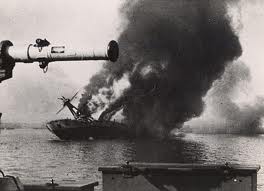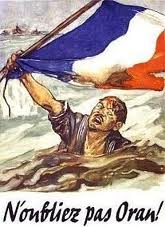 England’s last war against France—as recounted in Colin Smith’s book of that very title—was not fought in Napoleonic times. We are not talking Wellington versus Bonaparte at Waterloo. Rather: Winston Churchill versus Marshal Philip Petain, leader of Vichy France.
England’s last war against France—as recounted in Colin Smith’s book of that very title—was not fought in Napoleonic times. We are not talking Wellington versus Bonaparte at Waterloo. Rather: Winston Churchill versus Marshal Philip Petain, leader of Vichy France.
Their war began in earnest on 3 July 1940, when battleships of the Royal Navy lobbed 15inch shells into the French fleets at anchor in the Algerian ports of Mers-el-Kebir and Oran. The French admiral had rejected the demand to surrender and so the British opened fire.
 The battleship Bretagne was sunk, and the Province and Dunkerque were severly damaged. Almost 1,300 French sailors perished that day.
The battleship Bretagne was sunk, and the Province and Dunkerque were severly damaged. Almost 1,300 French sailors perished that day.
Meanwhile, in the south of England, French vessels at anchor in Plymouth and Portsmouth were boarded and forcibly taken over by British sailors.
Petain responded to the attacks by ordering Vichy planes to strike the Royal Navy’s base in Gibralter. He cut off diplomatic relations—meaning that the British could not maintain a consulate or embassy in Vichy. (Recall that Vichy was neutral. The USA, for example, kept a consulate there until after Pearl Harbour).
 The addition of the French navy to the navies of Italy and Germany would certainly cause Britain to lose the Mediterranean, and likely the war. Churchill’s grim determination that the French fleet must never fall into Hitler’s grasp was a watershed decision—one of several, during those early days when Britain stood alone.
The addition of the French navy to the navies of Italy and Germany would certainly cause Britain to lose the Mediterranean, and likely the war. Churchill’s grim determination that the French fleet must never fall into Hitler’s grasp was a watershed decision—one of several, during those early days when Britain stood alone.
The blood of 1,300 Frenchmen was the price to keep Great Britain in the war. It showed the world, particular the Americans, that Britain would see things through to the end.
